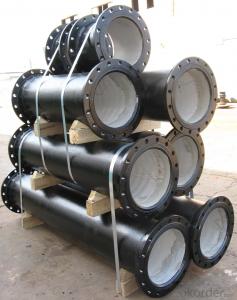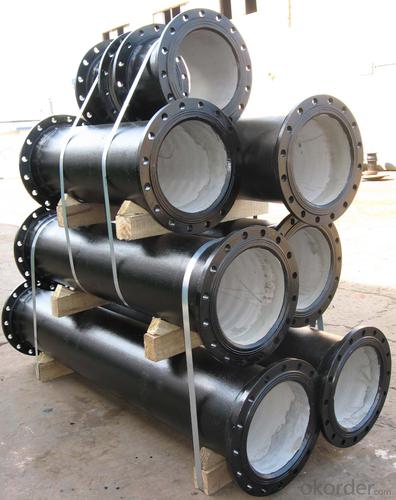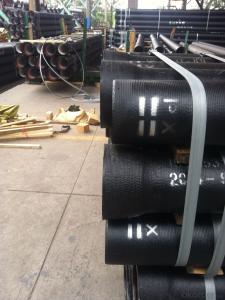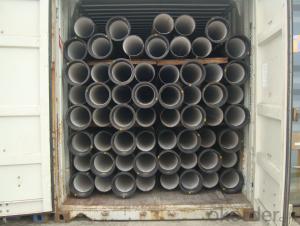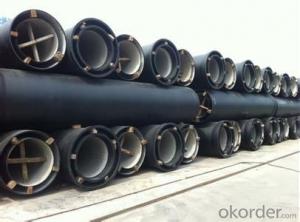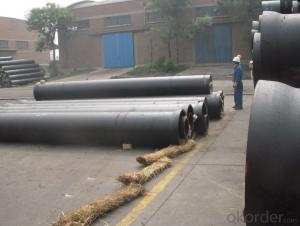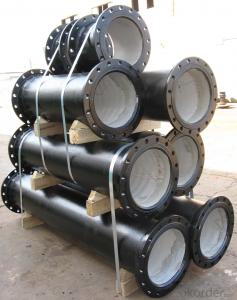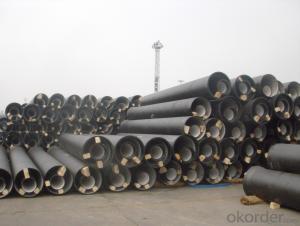DUCTILE IRON PIPES AND PIPE FITTINGS K8 CLASS DN900
- Loading Port:
- Tianjin
- Payment Terms:
- TT OR LC
- Min Order Qty:
- 22 pc
- Supply Capability:
- 3000 pc/month
OKorder Service Pledge
OKorder Financial Service
You Might Also Like
Material : Ductile Cast Iron
Size Range : DN 80mm to DN 2000mm
Unit Effective Length : 6m or 5.7m
Manufacture Standard: ISO 2531:1998/ EN 545:2006/EN 598:2007
Annual capacity : 200,000 tons
Coating Exterior: Zinc 130g/m2 according to ISO 8179-1 and bitumen coating 70 microns.
Cement Interior: Portland Cement/ High Alumina Cement/ Sulphate Resisting Cement Lining according to ISO 4179
Special requirements on external coating and internal lining can be applied
We also provide accessories such as SBR/EPDM rubber gaskets, lubricant paste, pipe caps, PE sleeves, etc.
Additional Parts:
Each pipe is strictly inspected according to related standard to ensure permanently high performance.
Easy Installation at site and service free for life
Long Service Lifespan
Quotation will arrive you within 24hours once we get your inquiry.
We guarantee offering you a competitive price.
A copy of original inspection reports of pipes will be offered after shipment.
Photos of loading process will be sent to the customer after shipment effect.
We will follow-up the delivery progress after shipment effect and update to the customer on weekly basis.
- Q: How does ductile iron pipe perform in areas with high soil acidity?
- Ductile iron pipe performs well in areas with high soil acidity due to its inherent corrosion resistance properties. The pipe is designed to withstand harsh environments and has a protective lining that prevents the acidic soil from causing damage. This lining acts as a barrier between the pipe and the soil, preventing the acid from corroding the iron. Additionally, ductile iron pipe has a high resistance to external loads, making it suitable for areas with unstable soil conditions. Overall, ductile iron pipe is a reliable choice for areas with high soil acidity as it can withstand the corrosive effects and provide long-lasting performance.
- Q: What are the typical installation methods for ductile iron pipe?
- The typical installation methods for ductile iron pipe include trenching, horizontal directional drilling, and jacking. In trenching, a trench is excavated and the pipe is laid and supported on a bed of aggregate. Horizontal directional drilling involves drilling a pilot hole underground and then pulling the pipe through the hole. Jacking is a method where the pipe is pushed into the ground using hydraulic jacks.
- Q: Can ductile iron pipes be used for underground compressed air systems?
- Yes, ductile iron pipes can be used for underground compressed air systems. Ductile iron is known for its strength and durability, making it suitable for handling high-pressure air. Additionally, ductile iron pipes have good resistance to corrosion and can withstand the underground environment, making them a reliable choice for compressed air systems.
- Q: How are leaks repaired in ductile iron pipe?
- Leaks in ductile iron pipe are typically repaired by cleaning and preparing the area around the leak, applying a suitable sealant or epoxy, and then securely fastening a repair clamp over the affected area. This clamp provides a tight seal and prevents any further leakage.
- Q: Are ductile iron pipes suitable for deep burial installations?
- Yes, ductile iron pipes are suitable for deep burial installations. Ductile iron is known for its durability and strength, which makes it capable of withstanding the pressure and weight of being buried deep underground. Additionally, ductile iron is highly resistant to corrosion, which further enhances its suitability for long-term underground applications.
- Q: What are the typical joint sealing requirements for ductile iron pipes under pressure?
- The typical joint sealing requirements for ductile iron pipes under pressure involve the use of gaskets and mechanical joints to ensure a leak-free connection. Gaskets are typically made of rubber or synthetic materials and are placed between the pipe ends to create a tight seal. These gaskets are designed to withstand the pressure of the flowing fluid and prevent any leakage. They also provide flexibility to accommodate for any slight misalignment or movement of the pipes. Mechanical joints, such as push-on joints or restrained joints, are another common method of sealing ductile iron pipes. These joints consist of a mechanical connection that securely holds the pipe ends together. They can provide a reliable seal without the need for additional gaskets. In addition to gaskets and mechanical joints, proper installation techniques are crucial for ensuring effective joint sealing. This includes proper alignment of the pipes, correct tightening of bolts or screws, and the use of appropriate lubricants or sealants. It is important to note that the specific joint sealing requirements for ductile iron pipes under pressure may vary depending on the application, the type of fluid being transported, and the applicable industry standards or regulations. Therefore, it is essential to consult the manufacturer's guidelines and relevant codes to determine the appropriate joint sealing requirements for a specific project.
- Q: Can ductile iron pipes be made of flexible waterproof sleeves?
- Usually, a bushing is used to make a pool. It is the conduit to the sink. However, the common casing is difficult to seal so that there is water leakage between the casing and the pipe and water leakage between the casing and the wall. Only the waterproof sleeve can solve the water leakage between the casing and the wall, but it can not solve the seal between the casing and the pipe, and the flexible waterproof bushing can solve two problems.
- Q: How does ductile iron pipe perform in areas with high soil compaction?
- Ductile iron pipe performs exceptionally well in areas with high soil compaction. One of the key advantages of ductile iron is its high strength and durability, which allows it to withstand heavy loads and pressures. In areas with compacted soil, where there is a greater likelihood of ground movement and settling, ductile iron pipe's superior structural integrity ensures that it remains intact and can effectively handle the stress. Additionally, ductile iron pipe has excellent resistance to corrosion. This is particularly important in areas with high soil compaction, as the compacted soil can often contain high levels of moisture or chemicals that may accelerate the corrosion process. Ductile iron's inherent resistance to corrosion helps maintain the pipe's integrity over time, even in challenging soil conditions. Another advantage of ductile iron pipe is its flexibility. This material has a high degree of flexibility, allowing it to absorb and distribute external loads more effectively. In areas with high soil compaction, where the ground may shift or settle, ductile iron's flexibility helps to minimize the risk of pipe failure or damage. Furthermore, ductile iron pipe has a smooth interior surface, which helps to improve its hydraulic performance. In areas with high soil compaction, where there may be limited space for proper compaction around the pipe, the smooth interior minimizes the risk of sediment buildup or clogging, ensuring efficient water flow. Overall, ductile iron pipe is an excellent choice for areas with high soil compaction. Its strength, corrosion resistance, flexibility, and hydraulic performance make it a reliable and durable option that can withstand the challenges posed by compacted soils.
- Q: What are the interface forms of ductile iron pipes? The best drawings are available. Thank you
- Because of this interface and the corresponding T sealing aprons can withstand greater deflection angle and greater tolerances, especially suitable for unstable formations and corners.
- Q: Are ductile iron pipes suitable for potable water systems?
- Yes, ductile iron pipes are suitable for potable water systems. Ductile iron pipes have been widely used in potable water systems for many years due to their durability, strength, and corrosion resistance. They are designed to withstand high-pressure water flow and can handle the challenges of underground installation. Additionally, ductile iron pipes have a smooth internal surface that prevents the buildup of scale or sediment, ensuring the delivery of clean and safe drinking water. They also have a long service life, making them a cost-effective choice for potable water systems. Overall, ductile iron pipes are a reliable and widely accepted option for potable water supply networks.
Send your message to us
DUCTILE IRON PIPES AND PIPE FITTINGS K8 CLASS DN900
- Loading Port:
- Tianjin
- Payment Terms:
- TT OR LC
- Min Order Qty:
- 22 pc
- Supply Capability:
- 3000 pc/month
OKorder Service Pledge
OKorder Financial Service
Similar products
Hot products
Hot Searches
Related keywords
